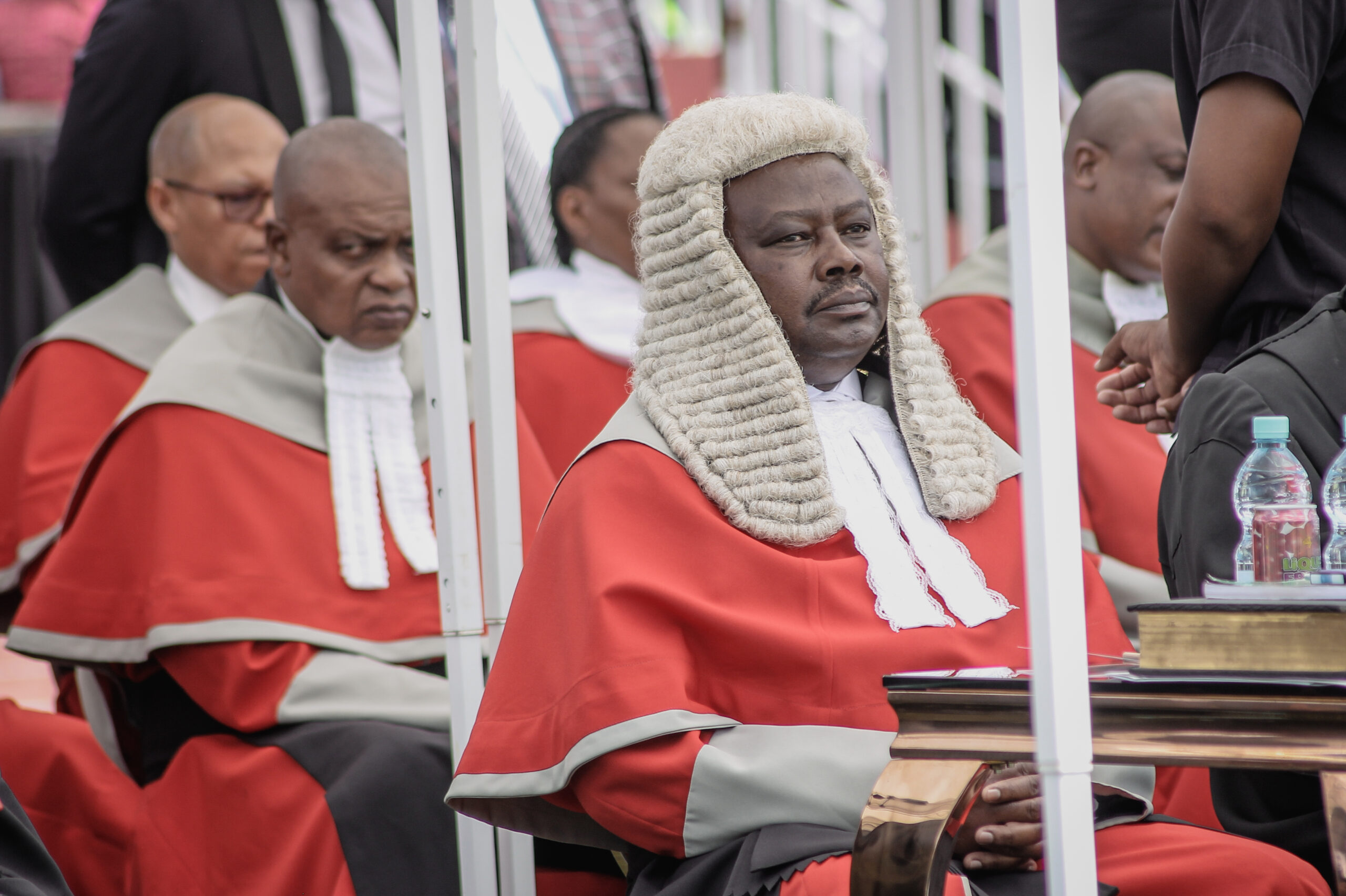*Mokitimi TÅ¡osane
Abstract
There is a debate over whether parliament failing to do its constitutional function to pass a bill before its dissolution is an emergency. Perhaps the failure to pass the bill leaves unaddressed constitutional, political, and social problems that have led this country into political and security instability with a bearing on economic development.
The discussions extend to whether in the circumstances, a declaration of the state of emergency as a precursor to recalling parliament does not amount to a legal pretext of an essentially political act in abuse of emergency powers. This essay sets to examine the State of Emergency regarding recalling of Parliament on two seemingly contradictory constitutional interpretations: Textualism and Pragmatism.
These two modes of constitutional interpretation will be applied where the alleged emergency upon which the state of emergency is predicated does not necessarily occur unexpectedly during the period between the dissolution of the parliament and the holding of general elections.
This curiosity is ignited by the recent dissolution of parliament before the promulgation of the proposed 11th Amendment to the Constitution into law. This has polarised public opinion on whether it is constitutionally permissible to recall parliament under the pretext of emergency to complete the work it failed to pass even during the wash-up period.
Apart from the inordinate delays which characterised the reform process, this tragedy has brought to the fore the need to invoke constitutional interpretations either to add salt to the injury or rescue the situation. Of particular interest is the basis of relying on one interpretation on which recalling parliament will be sustained or rejected. It is contended that the constitutional issues surrounding the possible recall of parliament under the guise of an emergency, are novel to our judicial debates as regards common modes of constitutional interpretation.
Further, would it not violate the doctrine of separation of powers when the King acting on the advice of the Council of State “apparently instructs†parliament to reconvene to pass a certain bill which parliament in its wisdom did not pass before dissolution? With that said, this essay discusses what the terms “emergency†and “state of emergency†mean.
With assistance from legal scholars, jurists, and other commentators the essay traverses and demonstrates the application of textualism and pragmatism as tools for interpretation of the constitution. Again, a general overview of the various arguments in support of, and in opposition to, the use of such methods and tools of constitutional interpretation is undertaken. The essay then concludes and advances recommendations.
Introduction
In his characteristic eloquence, the late Mahomed AJ described the Constitution as “a mirror reflecting the national soul, the identification of the ideals and aspirations of a nation; the articulation of the values bonding its people and disciplining its governmentâ€.
It is this well-articulated characteristic that stands against popular sovereignty in favour of constitutional morality, emphasising the supremacy of the constitution over any decision. This simply means that the constitution is a yardstick by which all other actions and decisions will be measured. However, one of the most fundamental questions of constitutional law scholars, and jurists has been how to interpret this supreme document which is a mirror reflecting the national soul.
While being generally a mirror, interpretation of the text of the constitution in issues bordering, inter alia, on political question doctrine has proven to be a highly controversial exercise.
Some constitutional provisions are drafted in general terms creating space for flexibility in cases of an unforeseen change and the possibility of alternative interpretations. James Madison “Father of the United States Constitution†also delved into the debates on visions on proper constitutional interpretation.
As asserted by Professor Michael Stokes in “The Relevance and Irrelevance of James Madison to Faithful Constitutional Interpretation†“it has thus become commonplace to assert that the Constitution itself contains no discernible rules or instructions concerning how it is to be interpreted.â€
In the words of Professor Jefferson Powell in “Constitutional Conscience: The Moral Dimension of Judicial Decision†“in almost every controversial decision, the judge will confront interpretative choices, many of which have multiple resolutions that can be justified by craftsman argument.†In such cases, judges, lawyers, jurists, or scholars are called upon to recognise overt ambiguities and uncertainties present in constitutional issues. Conditional on the circumstances, even textually clear provisions often raise alternative interpretations as the constitutional questions cannot always be resolved by purely linguistic formulae.
In various cases, constitutional theorists, lawyers, legal scholars, philosophers of law and judges are faced with cases which cannot only be handled with linguistics and semantics hence deviating from forcing mechanical constructs on the facts at hand.
Constitutional interpretation is not only the exclusive domain of the court albeit it exercises a fundamental adjudicative role in the tripartite governmental design. Political actors and other government officials often make decisions on constitutional questions based on constitutional interpretations from lawyers in the elected branches of government because, sometimes, the law masks and sanitises politics in a negative sense.
These officials and political actors are presented with choices among numerous plausible constitutional interpretations of a constitutional text or provision. Just as the courts, sometimes these actors must make decisions on constitutional circumstances remote from those contemplated by its original drafters, requiring the exercise of discretion and the weighing of consequences. This withstanding, ultimately, the courts have judicial authority (not supremacy) in matters of constitutional interpretation originating in politically controversial situations.
Since the dissolution of parliament on the 14th of July 2022 pending elections on the 7th of October 2022, legal scholars, jurists, lawyers and political actors were confronted with a serious legal dilemma on the constitutionality of recalling parliament on the basis of a state of emergency.
This dilemma bore to the fact that at least two strong arguments could obtain from well-crafted lawyerly interpretations from either side of the seriously disputed constitutional question – textualism or pragmaticism.
In these circumstances, the Council of State might find it necessary to either advise the King based on the linguistic text of the constitution or the alternative pragmatic interpretation weighing political, legal, economic, and social consequences. In all these interpretations, the quest would be to foster stability and promote the “general public goodâ€.
This essay passes no verdict on whether opting for either textual or pragmatic interpretation of the relevant provision would breed absurd and terrible results that do not promote “the general public goodâ€.
Therefore, this essay attempts to advance two contradictory interpretations to the meaning of provisions on recall of the parliament on state of emergency within the period of dissolution of parliament and holding of elections. This essay further discusses two of the most common modes of constitutional interpretation – textualism and pragmatism.
Furthermore, this essay demonstrates the application of these two modes of interpretation and advances an overview of the various arguments in support of, and in opposition to, the use of these methods of constitutional interpretation.
Constitutional Provisions
23. Declaration of emergency
Section 23(1) states that:
In time of war or other public emergency which threatens the life of the nation, the Prime Minister may, acting in accordance with the advice of the Council of State, by proclamation which shall be published in the Gazette, declare that a state of emergency exists for the purposes of this Chapter.
Section 23 (8) reads as follows:
The King may summon the two Houses of Parliament to meet for the purposes of this section notwithstanding that Parliament then stands dissolved, and the persons who were members of either House immediately before the dissolution shall be deemed, for those purposes, still to be members of that House, but, subject to the provisions of sections 61(4) and 63(4) of this Constitution, neither House shall, when summoned by virtue of this subsection, transact any business other than debating and voting upon resolutions for the purposes of this section
84. General elections
Section 84(2) of the constitution reads as follows:
If, after a dissolution of Parliament and before the holding of a general election of members of the National Assembly, the King is advised by the Council of State that, owing to a state of war or of a state of emergency in Lesotho, it is necessary to recall Parliament, the King shall recall the Parliament that has been dissolved and that Parliament shall be deemed to be the Parliament for the time being (and the members of the dissolved Parliament shall be deemed to be the members of the recalled Parliament), but the general election of members of the National Assembly shall proceed and the recalled Parliament shall, if not sooner dissolved, stand dissolved on the day immediately preceding the day fixed for such general election or, if more than one such day, the first of such days.
What is an “emergency†and “state of emergency�
The phrase “state of emergency†appears in the constitution. In order to declare the state of emergency under section 23, there has to be an emergency. This essay will discuss albeit at a basic level, the logic of conditionals which underlie the construction of sections 23 and 84(2) of the Constitution.
At this point, it is apt to define what the terms emergency and state of emergency mean.
The constitution does not expressly define either “emergency†or “state of emergencyâ€. This essay stands to be corrected but as far as it can tell, the courts have not ruled precisely upon their meaning. However, the court has on various occasions been seized with issues involving an “emergency†though emergency was not an issue for contention before them: ABC & Others v The Prime & Others (2020); and David Mochochoko v The Prime Minister & Others (2020). The only case which challenged the declaration of a state of emergency is Kabelo Ntitsane v The Prime Minister & Others (2022). Unfortunately, the judgement has not been delivered in the matter. Be that as it may, in the matter, the court was not required to give an exhaustive definition of either emergency or state of emergency.
Before delving into the literature on what is a state of emergency, it is apposite to define an emergency. As defined by the Concise Oxford Dictionary, an emergency is defined as “a serious, unexpected, and potentially dangerous situation requiring immediate actionâ€.
It is imperative to highlight that the “emergency†must be unexpected and requires immediate action. As regards the case in Lesotho, was it unexpected that parliament was to be dissolved on the 14th of July 2022 by operation of the constitution? Is it an emergency when parliament fails to pass a bill which took months and months on its desk before it was dissolved? Was it unexpected to the executive (the Right Honourable Prime Minister and his Cabinet) that if parliament failed to pass a bill until it is dissolved, then such a bill would collapse with it?
As soon as there is an emergency, if necessary then there arises a need to declare a state of emergency. The state of emergency may arise inter alia from situations as diverse as an armed action against the state by internal or external elements, a natural disaster, civil unrest, an epidemic, a pandemic, a financial or economic crisis or a general strike etc.
States of emergency are not uncommon occurrences, particularly in dictatorial regimes where the state of emergency may endure as long as the regime lasts. Other terms for referring to emergency situations are state of exception, state of alarm and state of siege.
The state of emergency is an application of a common law doctrine of exceptionalism developed and refined through the years to form an essential part of our constitutional jurisprudence. It presupposes that the legal system exists to protect the fundamental values of society.
However, there may arise exceptional circumstances that require that in order to maintain the legal system, extra-ordinary measures that are beyond the system itself may be resorted to in order to preserve those fundamental values of society made possible by the legal system.
The power to declare this was historically a prerogative of a sovereign. It is today, an act of the people in so far as it draws its legitimacy from a legal instrument. The contemporary concept of the state of emergency traces its origin from the historical Roman Dictator, a temporary officer appointed to provide ad hoc leadership in a national emergency or tumultus.
Using the comparative jurisprudence from the European Commission of Human Rights in Lawless v. Ireland (1961), the European Commission of Human Rights laid down a test now famously known as the Lawless Test to define what constitutes a public emergency or as the case may be, a state of emergency.
The Commission held that a public emergency is a danger or crisis that is –
- (a) Present or Imminent
- Exceptional
- Concerns the entire population, and
- Constitutes a threat to the organized life of the community.
Given the elements, would there genuinely and honestly be a conclusion that parliament failing to pass a bill satisfy this criterion? Would legal, security, [1] and political crises historical in nature dating as far back as independence or 30 years ago qualify as something which was unexpected?
Can these historical crises be interpreted to create an emergency such that a parliament which had months and months with a bill can be recalled to pass the same bill under the provisions of emergency? It is worth highlighting at this point that when parliament sat for the first time on the 14th of July 2017, the date, and time for its dissolution were automatically set by the operation of the constitution.
* • Mokitimi Tšosane is an admitted advocate in the courts of Lesotho working as the Judicial Activism and Public Interest Litigation Officer at the Transformation Resource Centre (TRC) in the Human Rights and Access to Justice Department. He is also a member of the Public Interest Litigation Committee of the Law Society of Lesotho. ORCID: http://orcid.org/0000-0003-2760-2290
NB: This essay does not in any way whatsoever reflect or represent the position or views of the Transformation Resource Centre on this issue.
Legal security?
Summary
- The discussions extend to whether in the circumstances, a declaration of the state of emergency as a precursor to recalling parliament does not amount to a legal pretext of an essentially political act in abuse of emergency powers.
- These two modes of constitutional interpretation will be applied where the alleged emergency upon which the state of emergency is predicated does not necessarily occur unexpectedly during the period between the dissolution of the parliament and the holding of general elections.
- Further, would it not violate the doctrine of separation of powers when the King acting on the advice of the Council of State “apparently instructs†parliament to reconvene to pass a certain bill which parliament in its wisdom did not pass before dissolution.

Your Trusted Source for News and Insights in Lesotho!
At Newsday Media, we are passionate about delivering accurate, timely, and engaging news and multimedia content to our diverse audience. Founded with the vision of revolutionizing the media landscape in Lesotho, we have grown into a leading hybrid media company that blends traditional journalism with innovative digital platforms.









